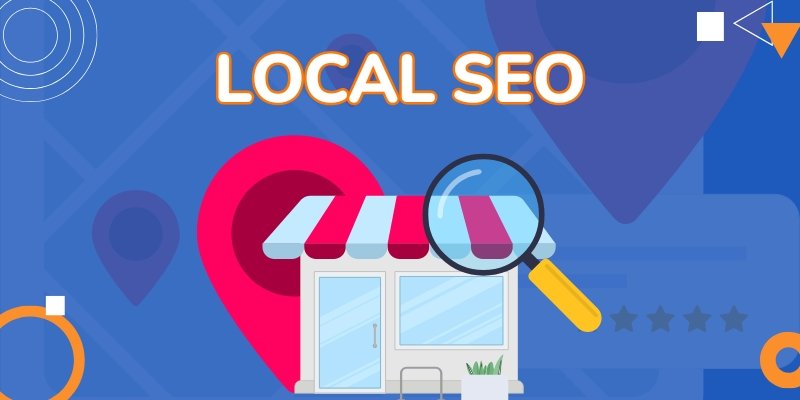Local SEO is about connecting your business with the people who are searching for your products or services in their immediate area. It’s not just about being found but about being found by the right people.
Local SEO is a strategy that helps your local business show up better in search results that are based on location. This includes appearing higher in unpaid results on Google Search, Google Maps and other search engines.
For instance, it can boost the ranking of your Google Business Profile in the local search results.

And improve your website’s ranking in regular search results.

Almost all search results are tailored to the user’s country. But local SEO focuses on reaching people in specific areas like cities and neighborhoods.
In the digital age, local SEO is the modern word of mouth. It ensures that your business is visible to those who need it most.
This helps businesses with physical locations like restaurants, dentists and mechanics. It also helps local service providers like plumbers, Moving Companies and Cleaners.
FYI
Local SEO is different from regular SEO because Google uses different methods and criteria to rank local results.
Why Is Local SEO Important?
Google provides billions of local search results every month. If your business shows up at the top for relevant searches, you’re more likely to get customers.
Google shows local results when it thinks people are looking for products, services or places near them or in a specific area.
Here are some examples of local keywords:
- Chicago Movers
- Movers Near Me
- Chicago Movers Near Me
- Long Distance Movers Near Me
- Local Movers Near Me
Businesses with strong local SEO usually rank highest for keywords like these making it easier for users to find and connect with them.
No matter what your business does or where it’s located you can likely reach potential customers through search.
How Local SEO Works
Local SEO helps Google know where your business is and what it offers. It also helps Google see your business as popular and trustworthy.
These factors can help your business rank higher when people search for related things.
When ranking businesses in Google Maps and the local pack Google looks at three main things:
- Relevance: How well the business matches what the user is searching for
- Distance: How close the business is to the user’s search location
- Prominence: How well-known and well-reviewed the business is
When ranking webpages in traditional search results Google looks at:
- Relevance: How well your webpage matches what the user is searching for
- Quality: How helpful and trustworthy your content is
- Usability: How well your webpage performs considering factors like speed and mobile-friendliness.
How to Do Local SEO
Now, let’s create a plan to improve your local rankings and boost traffic. Follow these steps to get started.
Do Local Keyword Research
Local keyword research means finding the search terms people use when looking for local products and services.
Ranking for these keywords brings highly targeted local traffic to your site leading to more customers.
Start by making a short list of keywords people might use to find your local business.
Here are a few ways to get started:
Research Your Competitors
Check what keywords your competitors rank for to get ideas. You can use keyword tools for this.
You can also filter based on metrics like:
- Volume: The average number of monthly searches for the keyword.
This helps you find the best keywords for your local SEO strategy.
Use Google Autocomplete
Google Autocomplete is a feature in Google Search that helps you finish your searches faster by predicting what you might be looking for.
Its main purpose is to save time by guessing your search query.
It can also help you find valuable long-tail keywords for local SEO because these predictions are partly based on your location.
For example, if you’re in Illinois, Chicago and you type “moving companies in chicago” into the search bar you’ll see suggestions specific to your area.

All these locations are near Illinois or in Chicago.
To find useful local keywords start typing keywords related to your business.
For example, if you run a cleaning service type in “cleaning services” to get a list of local keyword suggestions.
When you add local modifiers like “cleaning services Barrington,” you’ll see many other useful keywords.
Keep trying different combinations of local keywords. You’ll quickly build a list of keywords for your local business SEO.
Leverage Google Keyword Planner
Google’s Keyword Planner is useful for researching keywords for paid search campaigns but it also helps you find new keywords for your business.
Start by going to the “Discover new keywords” section.

Click on the “Start with a website” tab. Then, enter a competitor’s domain.

Click “Get results” and Google will suggest many keywords based on the terms found on that website.

Repeat this process with more of your top competitors and add all the relevant keywords to your list.
Another great feature of Keyword Planner is that it provides monthly search data for specific locations.
This feature is really helpful when you have many keywords and need to decide which ones to target first.
Optimize Your Google Business Profile
Your Google Business Profile is a free business listing that can appear in Google search results.

If you optimize your profile Google is more likely to rank it highly when potential customers search for relevant terms. This means those users are more likely to contact or visit your business.
To start, add and verify your Business Profile. Then, fill it out as much as possible with:
- Contact details
- Opening hours
- Photos & videos
- Business attributes
Keep Your Business Profile Active
Keeping your Business Profile active shows Google and users that you’re an engaged business owner. This can help you get higher rankings and more customers.
Make sure to keep your business details up to date like holiday hours or your address if you move.
This ensures users always have accurate and complete information.
Also, consider posting updates on your Business Profile to inform users about your latest news, events and offers.
It’s a great idea to ask your customers to leave reviews on Google.
Having more reviews and a higher star rating than your competitors can help you rank higher and attract more customers.

Respond to your Google reviews, too.
This shows that you care about your customers’ feedback and gives you a chance to address any negative comments.
Get & Monitor Local Citations
Citations are online mentions of your business name, address and phone number (NAP).
They often show up on business listings and social media pages.
NAP citations are important because Google may use them to verify that your business information is accurate and trustworthy.

When Google notices that your business’s name, address and phone number are consistent across different sites it becomes more confident that your business is real and reliable.
So, aim to get consistent citations on as many trusted websites as possible.
Encourage & Respond to Online Reviews
Reviews provide social proof, validate your expertise and give potential customers confidence in your business.
Focus on getting reviews on Google since they’re visible in search results and important for local rankings. But also get reviews on other platforms your customers use like Tripadvisor.
Quick Tips for Success:
- Ask happy customers to leave a review on your preferred platform(s)
- Use posters, business cards, etc., to encourage reviews. Include a QR code to make it easy for customers to find the review page.
- Add widgets on your website to make it easy for visitors to see and leave reviews.
- Don’t offer or accept money for reviews as it’s against the terms for Google and many other platforms.
Refine Your On-Page SEO
On-page SEO involves optimizing your webpages to rank higher in organic search results. It’s crucial for local search engine marketing.
If you rank well organically you have a strong chance of ranking in the local pack.
On-Page SEO Tips:
- Include your local keywords in page titles and meta descriptions
- Add specific location pages to your website to highlight your local services
- Use internal links to connect relevant pages on your site
Build Backlinks
Backlinks are links on other sites that point to yours and are a strong ranking signal in Google’s search algorithm.
Our study of over 16,000 keywords and 300,000 ranking positions shows that six of the top 15 ranking factors are related to backlinks.
Generally, the more relevant sites that link to you the higher you will rank for relevant keywords.
Traditional link building strategies also work for local SEO. This includes reclaiming lost links, fixing broken links and finding unlinked brand mentions.
Local Link Building Tips:
- Reach out to other local (non-competitor) businesses for links
- Reach out to local newspapers and websites to share your stories.
- Support and sponsor local events, as event websites may link to you
Local SEO Tools
Here are some tools to help keep your business in front of your target audience:
Google Search Console
This free tool from Google helps you monitor, maintain and improve your site’s presence in search results. It helps you understand how Google views your pages and ensures your site is crawlable.
Semrush
Semrush’s tool is great for local SEO. It monitors keywords and rankings at the ZIP code level and in local packs. It also helps you track changes in positions and watch your competitors.
Ahrefs
Ahrefs provides valuable insights into backlinks, keywords and competitor analysis helping improve your local SEO.
Similarweb
Similarweb offers comprehensive analytics to understand website traffic and performance aiding in local SEO strategies.
How to Monitor Your Local SEO Results
Your site’s local keyword rankings will change regularly for various reasons.
If your rankings drop your site traffic can decrease which might harm your business.
That’s why monitoring your progress is essential for your local SEO strategy.
Track Your Rankings in Google Maps
Use the Map Rank Tracker to check where your business profile ranks in Google Maps.
Select your business to get started.

Then, choose the local keywords you want to track.
There are AI suggestions to assist you.

Next, set your target location.
Each circle represents a search location where the tool will track your rankings.
If you have many nearby competitors it’s good to be more specific. If your competitors are spread out you might want to cover a larger area.

Once setup is complete choose a keyword you want to review from the drop-down menu at the top.
The heatmap will then show your business’s ranking in each search location.

Click any numbered circle to see the search results and check out your biggest competitors.

Local SEO is about making sure your business is seen by the people who matter most—those who are nearby and ready to buy.
FAQs
What is local SEO marketing?
Local SEO marketing is the process of optimizing your online presence to attract more business from relevant local searches. These searches take place on Google and other search engines.
What is local SEO optimization?
Local SEO optimization involves improving your website and online presence to rank better in local search results. This includes optimizing your Google Business Profile, using local keywords and getting local citations.
What is SEO localization?
SEO localization is the process of adapting your content and website to appeal to a specific local audience. This involves using local language, cultural references and region-specific keywords.
What is local SEO citation?
A local SEO citation is an online mention of your business’s name, address and phone number (NAP). Citations are important for verifying the legitimacy and location of your business.
What is Google local SEO?
Google local SEO refers to the practices used to optimize your business’s presence on Google, particularly in local search results and on Google Maps. It involves claiming and optimizing your Google Business Profile.
What is local business listing in SEO?
A local business listing in SEO is an online profile that contains your business’s NAP details and other relevant information. These listings can appear on various directories, social media platforms and local search engines.
What is local SEO and why is it important?
Local SEO is the practice of optimizing your online presence to attract more business from local searches. It is important because it helps businesses connect with customers in their local area increasing visibility and sales.
What is local SEO in digital marketing?
Local SEO in digital marketing is a strategy focused on optimizing a business’s online presence to attract local customers. It is a key component of digital marketing for businesses that serve specific geographic areas.
What is the difference between local SEO and general SEO?
Local SEO focuses on optimizing for local search results and attracting customers in a specific area while general SEO aims to improve a website’s visibility on a broader scale without a specific geographic focus.


